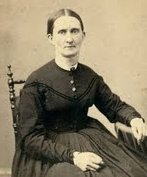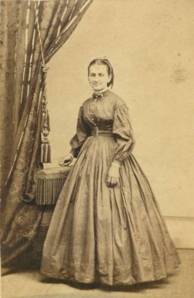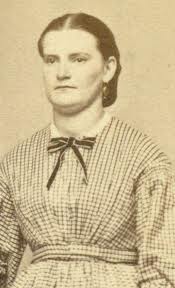 Rebellion Beauty, relates to an article reproduced here, dated June 7, 1862, published in Harper’s Weekly and is meant to be a Civil War Satire. This newspaper piece, reminded Bummer of the stories that Grandma Belle would tell, always prefacing the tale with a physical description of the main character. Grandma would hardly ever relate anything derogatory or negative regarding appearance or demeanor, unless two or three parties could substantiate her claims. Some of her classics were, “homelier than a cross-eyed mule, as smart as a bag of hammers” and if a gal was particularly despised, “she looks like she has been ridden hard and put away wet.” Grandma Belle had the ability to always weave into her story a lesson for the young Bummer, a favorite being,
Rebellion Beauty, relates to an article reproduced here, dated June 7, 1862, published in Harper’s Weekly and is meant to be a Civil War Satire. This newspaper piece, reminded Bummer of the stories that Grandma Belle would tell, always prefacing the tale with a physical description of the main character. Grandma would hardly ever relate anything derogatory or negative regarding appearance or demeanor, unless two or three parties could substantiate her claims. Some of her classics were, “homelier than a cross-eyed mule, as smart as a bag of hammers” and if a gal was particularly despised, “she looks like she has been ridden hard and put away wet.” Grandma Belle had the ability to always weave into her story a lesson for the young Bummer, a favorite being,
“Beauty is only skin deep, but meaness goes clear to the bone!”
Harper’s Weekly relates,
“BEAUTY.—Women, because beauty is supposed to be peculiar to them, are called the fair sex, but throughout nearly all foreign nations the women are no more beautiful than the men, and most of the men are hideously ugly. In England there are more beautiful women than there are anywhere else; but even their female beauty is so much the reverse of common that a woman herself, meaning to say that another is ugly, will term her ordinary, or, as that word is too generally pronounced, ornary.
 A beautiful girl, red and white, much resembles an apple-tree out in bloom; only apple-bloom fades rather faster than beauty. At twenty, beauty, like the Grave-digger’s tanner, “will last you nine year;” perhaps a year or two more; very likely not so many years; but its decay, though quickly observed, is slowly felt. Loss of beauty is of not much consequence to a wife; for a husband soon gets used to his wife’s beauty, and then, if ever so great, it is just as if it were not; girls had therefore better not accept men who want to marry them for their beauty, and a girl able to get a husband by more durable attractions is likely to be happier in marriage without beauty than she would be with it.
A beautiful girl, red and white, much resembles an apple-tree out in bloom; only apple-bloom fades rather faster than beauty. At twenty, beauty, like the Grave-digger’s tanner, “will last you nine year;” perhaps a year or two more; very likely not so many years; but its decay, though quickly observed, is slowly felt. Loss of beauty is of not much consequence to a wife; for a husband soon gets used to his wife’s beauty, and then, if ever so great, it is just as if it were not; girls had therefore better not accept men who want to marry them for their beauty, and a girl able to get a husband by more durable attractions is likely to be happier in marriage without beauty than she would be with it.
Beauty is chiefly a matter of limited roundness of form, relative proportion, and color in the right place; for color in the wrong place is not beautiful—for instance, red at the end of the nose. When rotundity exceeds a certain arch, the form which was beautiful grows funny. Beauty of figure and complexion is best preserved by moderation in eating, not to say drinking, plenty of exercise, and the use of soft water, without any other cosmetic than soap, of which the best is yellow. Beauty of feature is kept longest by discarding envy, hatred, malice, small vanity, and anxiety about money matters—emotions which gradually muddle the eye and pull the outlines of the face out of shape; anxiety about money matters especially having the effect of causing a dull, unhappy scowl, and distorting the mouth. Hence matronly beauty is rather often spoiled by engrossing attention to domestic economy; while, on the other hand, so very lively a beauty distinguishes unmarried girls and young wives who repose implicit confidence in the solvency of their husbands and fathers, as many of them do, although the income of those gentlemen depends upon their personal industry.
Habitual regardlessness of expense is the chief cause of the superior beauty of the superior classes, especially the aristocracy, producing that beautiful serenity of countenance which, reclining in the carriages that revolve around the Ring in Hyde Park, they most of them exhibit in strong contrast with the sordid uneasiness generally remarkable in the clouded and puckered visages of those who have, as the saying is, to pull the devil by the tail.
 The only perennial beauty is that which is sublimated by cultivating the moral sentiments and the intellect. It is very rare indeed. The rest is merely animal beauty, and when the beauty goes the animal only remains; the grace of the fawn is replaced by the clumsiness of the cow, the plump elegant young lady expands into the bulky middle-aged woman; and the fine girl who once was becomes what she and the dandies who then dangled after her used contemptuously to call an “elderly party.” Here a woman who had never any animal beauty to lose, but who has some spiritual beauty which is not to be lost, catches the other up and passes her by. Let this be a consolation to every plain sensible girl, whose personal defects are the subject of satire, if such a girl can over survive such satire.— Punch”
The only perennial beauty is that which is sublimated by cultivating the moral sentiments and the intellect. It is very rare indeed. The rest is merely animal beauty, and when the beauty goes the animal only remains; the grace of the fawn is replaced by the clumsiness of the cow, the plump elegant young lady expands into the bulky middle-aged woman; and the fine girl who once was becomes what she and the dandies who then dangled after her used contemptuously to call an “elderly party.” Here a woman who had never any animal beauty to lose, but who has some spiritual beauty which is not to be lost, catches the other up and passes her by. Let this be a consolation to every plain sensible girl, whose personal defects are the subject of satire, if such a girl can over survive such satire.— Punch”
Rebellion Beauty or Civil War Satire, may have been just Harper’s shot at what was considered either beauty or the beast during the Civil War. However, as Grandma Belle would relate, whether your sweetheart was pleasing to the eye of another was irrelevant to a couple on their 50th wedding anniversary.
Bummer

